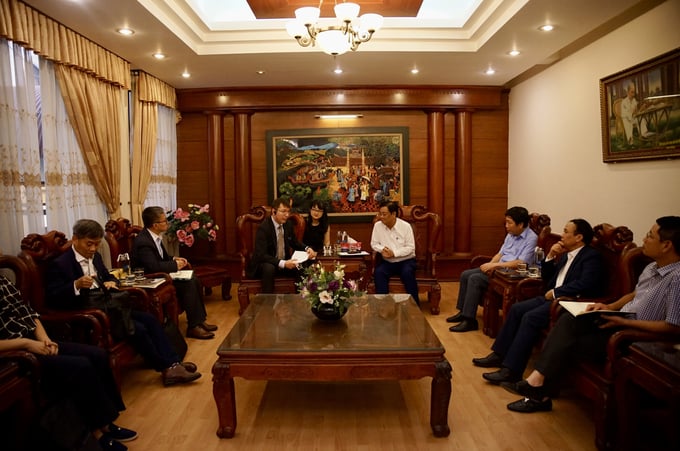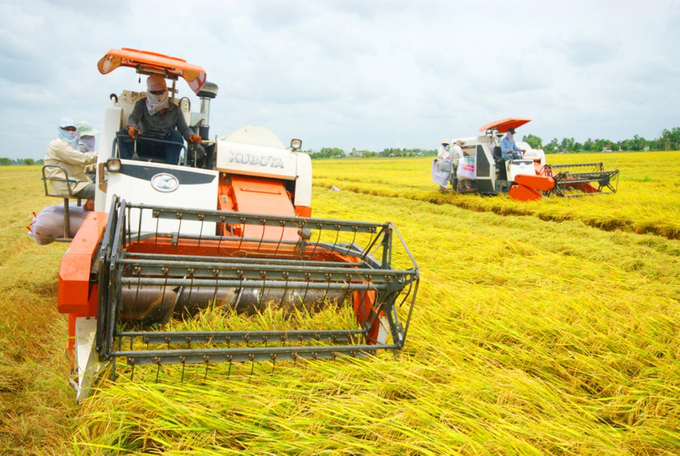June 15, 2025 | 11:39 GMT +7
June 15, 2025 | 11:39 GMT +7
Hotline: 0913.378.918
June 15, 2025 | 11:39 GMT +7
Hotline: 0913.378.918

Minister of Agriculture and Rural Development Le Minh Hoan met and worked with Paavo Eliste, Manager of the East Asia and Pacific Agriculture Practice Group at the World Bank.
On the afternoon of May 14, Minister of Agriculture and Rural Development Le Minh Hoan met and worked with Paavo Eliste, Manager of the East Asia and Pacific Agriculture Practice Group at the World Bank.
Sharing the results of the World Bank (WB) expert group and MARD in the past week, Mr. Paavo Eliste said that both sides had detailed discussions to promote the preparation of the Project Proposal (PIN) to submit to the Transformative Carbon Asset Facility (TCAF). Accordingly, this is an important milestone, the basis for countries and TCAF sponsors to step up the next steps.
In addition, the WB has actively prepared for the loan for the project on 1-million-hectare of high-quality, low-emissions rice associated with green growth in the Mekong Delta.
Mr. Eliste believes that many parties in the East Asia region are interested in low-emission rice production programs. Some countries are starting to invest in infrastructure for low-emission rice production. In addition, other countries such as Indonesia and the Philippines are interested in learning from Vietnam's experience in implementing this program.
Specifically, the WB is interested in and developing a regional program called the Multi-phase Approach (MPA) program to encourage client countries to invest in low-emission rice production.
"As a pioneer in low-emission rice production, Vietnam has a great opportunity to access many benefits from this program by affirming its role," Eliste said.
Vietnam has led other countries in low-emission rice production activities with the Sustainable Agriculture Transformation Project in Vietnam (VnSAT). Therefore, this is a great opportunity for Vietnam to participate in the new program, a multi-faceted approach to sharing multi-platform knowledge created by MPA. In addition, Vietnam has the opportunity to cooperate with international organizations such as IRRI, and ASEAN to share experiences from many years and learn from other countries in this field.
MARD will continue to promote Vietnam's institutional issues related to carbon credits and green growth. According to a WB representative, when participating in MPA, Vietnam will receive technical assistance, access to non-refundable aid and preferential carbon credits provided by program sponsors. WB has experience in accessing MPA in other countries, where WB can mobilize 20% of non-refundable aid under the program for participating countries, with a one-year deadline.
In response to the opinion of the East Asia and Pacific Agriculture Practice Group Manager (WB), Minister Le Minh Hoan evaluated this as a new approach. In the field of low-emission rice production, Vietnam has advantages when implementing the 1-million-hectare high-quality rice project after the VnSAT project. The fact that people in the project area already have conversion thinking is an advantage and enthusiasm for the new project.
The Ministry has directed the National Agricultural Extension Center to develop a community agricultural extension system and enhance the capacity of cooperatives, and farmers to "absorb" issues related to the 1-million-hectare high-quality rice project.
From the VnSAT project, the Ministry of Agriculture and Rural Development will evaluate risks and move towards risk management to minimize conflicts in the project, making it difficult for the implementation of the project by the Ministry and WB funding sources.

The Ministry of Agriculture and Rural Development will continue to promote Vietnam's institutional issues related to carbon credits and green growth. Photo: TL.
In addition, Minister Le Minh Hoan said that the Ministry will continue to promote Vietnam's institutional issues related to carbon credits and green growth.
The Ministry has established the Coordination Office for the 1-million-hectare rice program, with models for comparison, helping people understand the benefits and mandatory procedures when cultivating high-quality, low-emission rice according to the project. In addition to the commitment of private sector participation, MARD leaders expect WB to continue supporting the development of effective models, becoming a beacon for all farmers in the region.
"We talk a lot about procedural, technical, benefits, Measurement, Reporting, and Verification (MRV) tools, but we need to answer simple questions from farmers such as whether implementation is difficult, whether costs are incurred, and whether there is a market for this type of rice," Minister Le Minh Hoan worried.
Therefore, MARD has requested the construction of a communication system for people to voluntarily understand and participate. In addition, the Ministry has proposed a support package for the National Agricultural Extension Center to enhance the capacity of partners participating in the project. Minister Le Minh Hoan suggested that WB experts pay attention to this content.
Translated by Dieu Linh

(VAN) The UNESCO Global Geopark revalidation of Non nuoc Cao Bang and the transition to a two-tier administrative model are presently undergoing a pivotal moment in Cao Bang, the northernmost province of Vietnam.
/2025/06/13/5330-2-004539_953.jpg)
(VAN) Changing policy mindset and removing investment barriers are urgent requirements to open up new development space for enterprises in the agricultural sector.

(VAN) The areas include the restoration of five million hectares of marine ecosystems.

(VAN) Dr. Le Van Nguyen, Director of the Institute of E-Commerce Management (ECM), emphasizes the potential for green development through the cultivation of fruit trees, particularly in provinces such as Son La.

(VAN) VAAS and numerous Vietnamese enterprises have signed cooperation agreements with Japanese partners to promote agricultural technology and trade connectivity.
/2025/05/29/5625-12-214801_567.jpg)
(VAN) Provincial mergers in the Mekong Delta promise to streamline administration, expand inter-provincial raw material areas, and foster close linkages in agricultural value chains, benefiting both businesses and cooperatives.

(VAN) Merging Mekong Delta provinces contributes to the expansion of agricultural raw material areas, addressing previous constraints caused by provincial boundaries. Additionally, this expansion will reduce costs and strengthen linkages between businesses, cooperatives, and farmers.